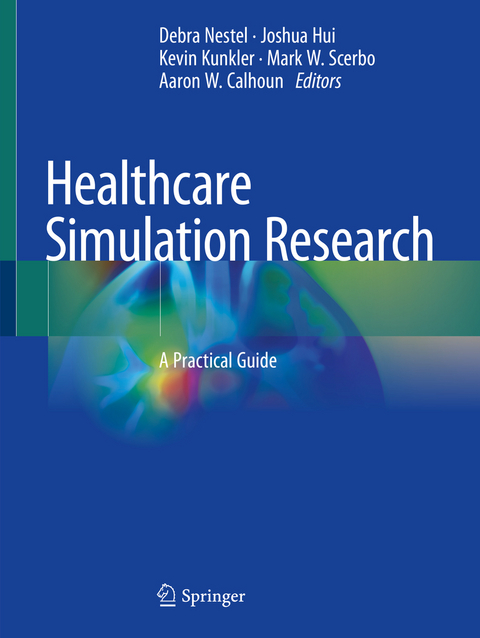
Healthcare Simulation Research
Springer International Publishing (Verlag)
978-3-030-26836-7 (ISBN)
Debra Nestel, PhD FSSHProfessorMonash Institute for Health & Clinical Education, Monash UniversityDepartment of Surgery, University of MelbourneVictoriaAustralia Joshua Hui, MD, MS, MHAAssociate Physician Kaiser Permanente Los Angeles Medical CenterEmergency DepartmentLos Angeles, CAUSA Kevin Kunkler, MD ProfessorTexas Christian Univ. and Univ. of North Texas Health Science Center School of Medicine Department of Educational Affairs Fort Worth, TXUSA Mark W. Scerbo, PhD, FSSH, FHFESProfessor Department of PsychologyOld Dominion University Norfolk, VAUSA Aaron W. Calhoun, MD, FAAP, FSSHProfessorDepartment of Pediatrics, University of Louisville School of Medicine and Norton Children's HospitalLouisville, KY USA
Section I. Introduction to Healthcare Simulation Research .- Ch 1: Developing expertise in healthcare simulation research.- Ch 2: A contemporary history of healthcare simulation research.- Ch 3: Programs of research in healthcare simulation.- Ch 4: Starting your research project: from problem to theory to question.- Ch 5: Overview of serious gaming and virtual reality.- Ch 6: Overview of computational modeling and simulation.- Section II. Finding and Making Use of Existing Literature.- Ch 7: Seeking, reviewing and reporting on healthcare simulation research.- Ch 8: Systematic and nonsystematic reviews: choosing an approach.- Section III. Qualitative Approaches in Healthcare Simulation Research.- Ch 9: Introduction to qualitative research in healthcare simulation.- Ch 10: Key concepts in qualitative research design.- Ch 11: Refining your qualitative approach in healthcare simulation research.- Ch 12: In-depth interviews.- Ch 13: Focus groups in healthcare simulation research.- Ch 14: Observational methods in simulation research .- Ch 15: Visual methods in simulation-based research.- Ch 16: Survey and other textual data.- Ch 17: Transcription and data management.- Ch 18: Grounded theory methodology: key principles.- Ch 19: Analyzing data: approaches to thematic analysis.- Ch 20: Naturally occurring data: conversation, discourse, and hermeneutic analysis.- Section IV. Quantitative Approaches in Healthcare Simulation Research.- Ch 21: Quantitative research in healthcare simulation - an introduction and discussion of common pitfalls.- Ch 22: Research and hypothesis testing - moving from theory to experiment.- Ch 23: Designing quantitative research studies.- Ch 24: Outcome measures and data.- Ch 25: Designing, choosing, and using assessment tools in healthcare simulation research.- Ch 26: Reliability and validity.- Ch 27: Statistical analysis: getting to insight through collaboration and critical thinking.- Ch 28: Nonparametric tests used in simulation research.- Ch 29: Contemporary analysis of simulation-based research data: P values, statistical power, and effect size.- Ch 30: Advanced statistical analyses.- Section V. Mixed Methods and Data Integration.- Ch 31: Applying mixed methods research to healthcare simulation.- Ch 32: Making use of diverse data sources in healthcare simulation research.- Section VI. Professional Practices in Healthcare Simulation Research.- Ch 33: Writing a research proposal for sponsorship or funding.- Ch 34: Writing an ethics application.- 35: Strategies in developing a simulation research proposal.- Ch 36: Identifying and applying for funding.- Ch 37: Anatomy of a successful grant proposal.- Ch 38: Establishing and maintaining multicenter studies in healthcare simulation research.- Ch 39: Supervision in healthcare simulation research: creating rich experiences.- Ch 40: Project management in healthcare simulation research.- Ch 41: Disseminating healthcare simulation research.- Ch 42: Writing for publication.- Ch 43: Peer review for publications: a guide for reviewers .- Section VII. Getting Started in Healthcare Simulation Research: Tips and Case Studies .- Ch 44: Unpacking the social dimensions of research - how to get started in healthcare simulation research.- Ch 45: Case Study 1: Joining the research conversation: the romance and reality.- Ch 46: Case Study 2: Discovering qualitative research.- Ch 47: Case Study 3: Application of quantitative methodology.- Ch 48: Case Study 4: Navigating the peer review process in healthcare simulation: a doctoral student's perspective.
| Erscheinungsdatum | 27.11.2019 |
|---|---|
| Zusatzinfo | XVII, 368 p. 43 illus., 25 illus. in color. |
| Verlagsort | Cham |
| Sprache | englisch |
| Maße | 210 x 279 mm |
| Gewicht | 1060 g |
| Themenwelt | Informatik ► Weitere Themen ► Bioinformatik |
| Medizin / Pharmazie | |
| Naturwissenschaften ► Biologie ► Genetik / Molekularbiologie | |
| Technik ► Medizintechnik | |
| Schlagworte | Academic Medicine • computer simulation • Healthcare Simulation • History of simulation • medical education |
| ISBN-10 | 3-030-26836-5 / 3030268365 |
| ISBN-13 | 978-3-030-26836-7 / 9783030268367 |
| Zustand | Neuware |
| Informationen gemäß Produktsicherheitsverordnung (GPSR) | |
| Haben Sie eine Frage zum Produkt? |
aus dem Bereich


